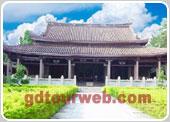1) Confucian scholar
儒学者
1.
As a Confucian scholar in the Yi Dynasty,Kang Hang(1567—1618) was born in South Korea s Jeollanam-do and was taken to prison by the Japanese troops in 1597.
姜沆(1567—1618),朝鲜李朝时代的儒学者,出生于全罗道灵光郡流峰里,1597年9月23日被日军囚禁。
2) Confucianism
儒学
1.
"Unification between Human Beings and Nature "of Confucianism and Protecting of the Living Environment of Human Beings;
儒学的“天人合一”与人类生存环境保护
2.
Influence of Confucianism on the Ethics in TCM and Its Permeation;
儒学对中医伦理学的影响与渗透
3.
Correspondence between college students Sanitary personality and confucianism;
大学生健全人格与儒学的契合
3) The Confucianism
儒学
1.
He suggested that though both the Confucianism and the Buddhism are different in means,ways and procedures,they have been essentially attempting to solve the puzzles and hardships people have faced in the world.
尽管如此,构成梁漱溟思想理论主体的仍是儒学。
2.
Against the contradiction of the theory and reality in the Confucianism only" and the complex relationship between the school of Huang-Lao and kingcraft, following the clues of "the Confucianism only "s precursor, preparative and consummation, the study outlines the course of the establishing of Han Dynasty s ideology under the support of kingcraft of Huang-Lao.
本论文从“儒术独尊”问题反映出的理论与现实的矛盾和黄老之学与帝王之道的关系出发,以儒术独尊的先导、准备、完善为主要线索,勾勒出在黄老帝王之道依托下,儒学成为汉代国家意识形态的历程。
4) Confucian
儒学
1.
Discuss on Yang Xiong’s Book of Fa Yan Returning to Pre-Qin’s Confucianism;
论扬雄《法言》对先秦儒学的回归
2.
The Setting of “Five Classics Doctorate” and the Formation of Confucian Worship Position;
“五经博士”的设置与儒学尊崇地位的形成
5) Confucian studies
儒学
1.
On Tokutomisohou s Common-people Doctrine and Confucian Studies;
近代日本的“平民主义”思想与儒学——以德富苏峰为中心
2.
The rapid economic development in East Asia since 1970~1980s arouses nowadays a great debate about the value of Confucian studies .
20世纪70~80年代以来,东亚经济迅猛发展,引起了"儒学价值"在当代的大讨论。
3.
The Confucian studies established by Confucius and Mencius came into being in the Spring and Autumn Period under the background of great development of the capitalist factors,and reflected the developing requirement of the capitalist factors,just as the Renaissance and the Enlight enment etc.
孔孟儒学产生于春秋战国时期资本主义因素有很大发展的历史背景下 ,而且反映了资本主义因素发展的进步要求 ,正如西欧封建社会的文艺复兴、启蒙运动等思潮反映了资本主义萌芽发展的时代要求一样。
6) the Confucian school
儒学
1.
The crucial point in the discussion of the Confucian school and Confucianism lies in the views on the similarities and differences between the Confucian school and religion.
儒学论者与儒教论者讨论的焦点在于如何看待儒学与宗教的异同。
2.
The main current of the Chinese historical culture brought about by the Confucian school creates objectively the age old and large scale Chinese historical culture, and builds up the particular social tradition of civilization in the Chinese history.
儒学制度化是中国历史上理论与政治权力互动的产物。
3.
Zhuxi and Wang Yangming were the important represerting figures of the Confucian School.
朱熹、王阳明是儒学思想流派中的两个重要代表 ,蒋介石对王阳明备加推崇 ,对朱熹则褒贬互见 ,但他对儒学的尊崇态度使其与二者间实际都保持着强烈的传承关系。
参考词条
补充资料:海阳县儒学宫

海阳县儒学宫
海阳县儒学宫位于潮州城区昌黎路和文星路交界处。俗称红学、学宫。始建于南宋绍兴年间,景炎三年(1278),后毁于火。明洪武二年(1369)重建大成殿,虽历经沧桑,其主要建筑大成殿仍完整地保留了明初粤东地区殿堂建筑的风貌特点,以后历代屡有增建,始成规模宏大的建筑群。
殿中供孔子及其弟子塑像。宫内现存大成殿、泮池、棂星门、照壁等建筑,只占原来面积的三分之一。其大成殿保留着明代的宫殿式建筑风格,抬梁式屋架由43支大柱支撑,殿周有石栏杆围护。近年来曾重修棂星门、金声门、玉振门和泮池,并嵌有明、清维修学宫碑记6块。学宫是重要的革命纪念地,国民革命军二次东征时的东征军第一师政治部和南昌起义军军官教导团均曾驻扎于此。学宫现为潮州市博物馆馆址。
说明:补充资料仅用于学习参考,请勿用于其它任何用途。